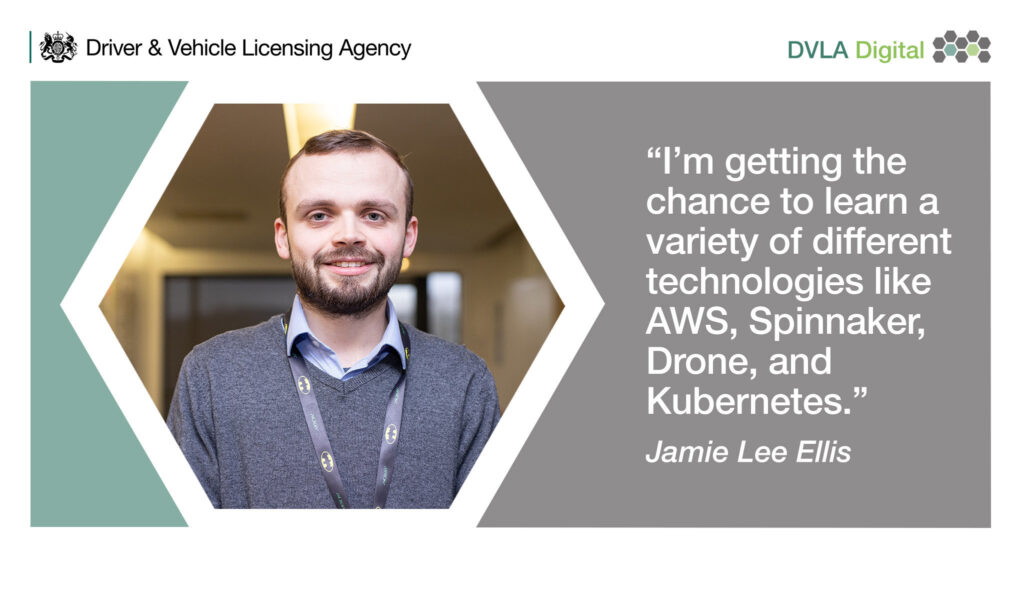What is a Cloud Engineer?
A Cloud Engineer is responsible for any technological duties associated with cloud computing, including design, planning, management, maintenance and support of cloud systems and services.
Cloud computing is the on-demand delivery of IT resources over the iInternet with pay-as-you-go pricing. Instead of buying, owning, and maintaining physical data centres and servers, you can access technology services, such as computing power, storage, and databases, on an as-needed basis from a cloud provider like Amazon Web Services (AWS).
What does a Cloud Engineer do in DVLA?
The Cloud Engineering team at DVLA is the capability responsible for building the strategic cloud native platform for DVLA across both AWS and Azure. One part of this is to create a fully automated CI/CD pipeline that all current and future products are able to utilise. The end goal would include a self-service portal whereby developers input their service requirements and the tools automate the creation of the environment and resources they need.
What sort of products might I be working on as a Cloud Engineer?
You may work on the following:
- Bitbucket
- Nexus
- Self Service Platform
- Kibana
- Spinnaker
- AWS
- JIRA
- Drone
- Instana
- PagerDuty
- Confluence
What experience would I need to become one?
Experience in the following is important:
- Linux skills, for example, scripting or terminal
- programming skills, for example, JavaScript or Python
- experience with a cloud provider like AWS or Azure
- Kubernetes or Docker experience
- familiarisation with DevOps methods – https://aws.amazon.com/devops/what-is-devops/
Government Digital and Data Profession Skills Snapshot
The table below shows the skills required at each level:
| Skill | Junior Cloud Engineer | Cloud Engineer | Senior Cloud Engineer | Lead Cloud Engineer | |
| 1 | Coding | Awareness | Awareness | Awareness | Working |
| 2 | Information Security | Awareness | Awareness | Working | Practitioner |
| 3 | IT Infrastructure | Awareness | Working | Practitioner | Expert |
| 4 | Modern Standards Approach | Awareness | Working | Practitioner | Expert |
| 5 | Ownership and Initiative | Awareness | Working | Working | Practitioner |
| 6 | Problem Solving | Awareness | Awareness | Working | Working |
| 7 | Service Focus | n/a | Working | Working | Working |
| 8 | Systems Design | Awareness | Working | Practitioner | Practitioner |
| 9 | Systems Integration | Awareness | Working | Practitioner | Expert |
| 10 | Technical Understanding (Infrastructure Engineer) | Awareness | Working | Practitioner | Expert |
| 11 | Testing | n/a | Awareness | Working | Practitioner |
| 12 | Troubleshooting and Problem Resolution | Awareness | Working | Practitioner | Expert |
DVLA Cloud Engineer, Jamie Lee Ellis tells us why he loves being a Cloud Engineer:
“I love being a Cloud Engineer because it allows me to challenge myself every day to find solutions to provide infrastructure support to the developers here at the DVLA. I’m currently working on the self-service project where we are working to provide all the function for self-serving a Kubernetes Platform running on EKS in AWS – a tool that makes life easier and speeds up the process for the developers. I’ve learnt so much over the last year and can’t wait to keep learning and improving myself while being able to take pride in what I do.”

What soft skills might a Cloud Engineer have?
As a Cloud Engineer, you should have strong:
- communication skills to work as a team but also to interact with developer teams and support them
- teamwork skills – essential as you would work in an agile environment, all working towards our sprint goals
- problem solving skills to work out how to fix issues with infrastructure
What opportunities are there to progress in the field?
You can start as a Junior Cloud Engineer and work your way up to Lead Cloud Engineer. This takes a lot of training and experience but if it’s something you really want, the opportunities are out there!
An example includes the Cloud Academy Programme. Starting in 2020, 10 candidates were given the opportunity to gain entry-level cloud experience, working in cloud teams whilst studying for certifications to start a career in the field.

